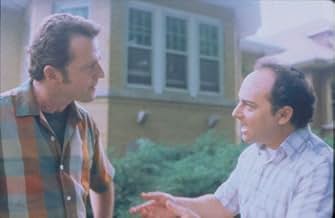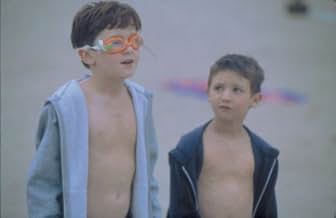NOTE IMDb
6,5/10
2,9 k
MA NOTE
Ajouter une intrigue dans votre langueA Catholic boy tries to convert a terminally ill Jewish boy, so he will be able to go to Heaven.A Catholic boy tries to convert a terminally ill Jewish boy, so he will be able to go to Heaven.A Catholic boy tries to convert a terminally ill Jewish boy, so he will be able to go to Heaven.
John Gleeson Connolly
- Roger O'Malley
- (as John Connolly)
Avis à la une
This movie is beautifully written and simply acted, with wonderful performances from the child actors bringing it to life. It deals with subtle and complex issues of faith and love, parenting, friendship and flat-out chutzpah. The character of the Rabbi, played by Kevin Pollack, is a joy.
Stolen summer explores what faith means in action and who's got it right. Done from a child's questioning point of view it gets in to and away with some very tough and unresolvable issues. The kids treat the notion of getting in to heaven, whose God is right, what happens when you die- all as things you can actually ask about, and think about. The result is heartfelt and up to the end, wrenching in its honesty.
The final scene of the movie has absolutely no connection to the rest of story. Or rather, it seeks to tie up every single thread and gives you all those answers, revealing in the final two minutes the nature of prayer and the meaning of faith. Predictably it comes out as shallow and baffling. Where did the movie go? The actors are wrenched from any connection to any part of the story leading up to that moment and left doing a Hallmark card. The scene reeks of a desperate move to appeal to some research-specified demographic, the implausible act of an executive justifying his salary by telling the writer what the story needs.
Up until the Advent of Executives, this is a lovely movie, and a great story.
Stolen summer explores what faith means in action and who's got it right. Done from a child's questioning point of view it gets in to and away with some very tough and unresolvable issues. The kids treat the notion of getting in to heaven, whose God is right, what happens when you die- all as things you can actually ask about, and think about. The result is heartfelt and up to the end, wrenching in its honesty.
The final scene of the movie has absolutely no connection to the rest of story. Or rather, it seeks to tie up every single thread and gives you all those answers, revealing in the final two minutes the nature of prayer and the meaning of faith. Predictably it comes out as shallow and baffling. Where did the movie go? The actors are wrenched from any connection to any part of the story leading up to that moment and left doing a Hallmark card. The scene reeks of a desperate move to appeal to some research-specified demographic, the implausible act of an executive justifying his salary by telling the writer what the story needs.
Up until the Advent of Executives, this is a lovely movie, and a great story.
I don't think I'm slanted because much of the film was made in my hometown... and the writer-director is the youngest son of a longtime friend. But I thought I'd better establish those facts up front.
If you want to capture the true flavor of the south side of Chicago in the '70s, this movie does it. From the scenes in and around Holy Cross church in Deerfield, to the beautiful Jewish temple on the south side, to the 76th Street beach, to scenes in and around Chicago bungalows, even under the L tracks, this film has it. I grew up on a block on the south side where we were the only family that was not Irish-Catholic. This film depicts the values and relationships of those types of families very well.
Will anyone get a Golden Globe or an Academy Award from "Stolen Summer"? Probably not. But if you want to spend a couple of hours enjoying a good movie with a real message--go see "Stolen Summer". If you're a Chicagoan and want to see a slice of home... so much the better.
If you want to capture the true flavor of the south side of Chicago in the '70s, this movie does it. From the scenes in and around Holy Cross church in Deerfield, to the beautiful Jewish temple on the south side, to the 76th Street beach, to scenes in and around Chicago bungalows, even under the L tracks, this film has it. I grew up on a block on the south side where we were the only family that was not Irish-Catholic. This film depicts the values and relationships of those types of families very well.
Will anyone get a Golden Globe or an Academy Award from "Stolen Summer"? Probably not. But if you want to spend a couple of hours enjoying a good movie with a real message--go see "Stolen Summer". If you're a Chicagoan and want to see a slice of home... so much the better.
Despite what you may have seen on project greenlight that would depict this film as a film that was not put together well and full of problems, it's not. This film is one of those rare films that invokes some feeling and those are always good in my book. Whether you have or haven't heard of project greenlight, rent this film.
Stolen Summer is all coy piano music; character arcs we anticipate and flimsy narrative frameworks that wouldn't necessarily feel out of place in a television movie. Hark, then we spot that the film was actually the result of a television programme; a show set up by endowed Hollywood acting royalty in the form of Ben Affleck and Matt Damon and designed to get independent films off the ground when they wouldn't ordinarily see the light of day – the sentiment a whole lot better than the end product, while somewhat tellingly, the show has hardly flourished since. Much like the film that was a result of it, the experiment was done with the best of intentions although ultimately came out a little flat. Stolen Summer is very much the sort of piece that possesses the capability of attracting great criticism, but it isn't necessarily one of those films one particularly takes pleasure from criticising; you root for it from its humble beginnings right the way through to its, albeit relatively phony, climax, but all the while willing it on to pull away from tepid foundations and spiritless crucibles so as to widen out into a broader; more inspiring, surprising realm. Alas, it doesn't quite make it and if anything, comes close to rather annoying the viewer in the process.
The film covers that of a Chicago based family in the summer of 1976; specifically, this family and their slow inception into varying religious realms through the presence of a local Jewish community whom come to have somewhat of an impact on them. The family, staunch Catholics named the O'Malley's, consist of an array of archetypes ranging from the hard-nosed and very masculine father; to the young son on the cusp of adulthood; to the much younger infant son stuck in there amidst the oft-worried housewife/mother whom essentially functions as a voice of antagonism when she isn't required to remain anonymous. The father, a certain Joe (Quinn), is a firefighter but is a beer swilling; easily wound up guy whom enjoys a gamble with his colleagues at work, and lives for that sensation of working long; hard and manly hours in a physical job so that he may provide for a family he thus feels exists to be bossed about on account of this. Patrick (Kaye-Thomas), Joe's eldest son, is near-enough in his twenties; a softly spoken individual, wiry and not the pit-bull his father is - a person with the steady job of a lifeguard and imbuing characteristics that generally clash with that of his dad.
The sweetest, and probably most substantial strand, covers that of Pete (Stein), who's the youngest of the family and a kid now out of his Catholic school given the summer holidays have begun. Pete has a confused outlook on the all of the world; life and most things around him; a boy with a fear of Hell, damnation and such recently instilled into him via the school, and thus sees himself as a bit of sinner or as someone going out of his way to avoid Godly retribution; so much so that he decides to dedicate the entire break to essentially repenting or trying to find redemption for a bad act he hasn't even done, something eventually forming into the encouraging of a certain young, local but terminally ill boy named Danny (Weinberg) to become Catholic. There is a telling moment on the eve of what Pete labels his "quest", an exchange between he and another boy playing baseball out there on a diamond; the large metallic fence surrounding the pitch and housing either boy on either side of it an indication of their separate sides: a physical splitting of how the respective children will spend their break, a divide surmising one boy and that of sports and leisure and another soul searching away from such things.
Pete's proverbial quest for redemption syncs up nicely with Affleck's own off screen repenting, a pouring of the cash he most certainly made for the previous year's monstrosity Pearl Harbour into that of humbler; more rounded foundings. Upon undertaking the pilgrimage, Pete comes to discover alternate religions and eventually intermingles with the local Jewish community; initial ignorance encapsulated by his meagre Cynagog suggestions early on, which would make little sense to execute. Pete's eventual coming to bond with Danny sees this child's unfortunate disease loom over proceedings; the kid seriously ill enough to be in and out of chemotherapy and yet finds room to swim unenviable distances in what are perceived as "record times" whilst out at sea.
Spinning around Pete's journey of self-discovery lies Joe's strand of being forced into confronting prejudices, a plot line to the film exuding degrees of obligatoriness and painfully highlighting its often languid, often standardised nature of rolling through the motions. It's here the film provides us with politics that are so firmly in the right place, that their entrenchment in such areas actually becomes a little grating. Stolen Summer very much feels like a machine that's just been oiled a little too well; it is often impassive and feels mostly processed, its cogs and wheels therein beautifully kept and working to such a pristine order that does not allow for a great deal of involved antagonism; does not allow for a great deal of ambiguity nor a great deal of blurring of anybody's morals. The piece very much the sort of film refusing to deviate from its grounded route, and it will at once both suffer and excel in its own peculiar ways to varying people as a result.
The film covers that of a Chicago based family in the summer of 1976; specifically, this family and their slow inception into varying religious realms through the presence of a local Jewish community whom come to have somewhat of an impact on them. The family, staunch Catholics named the O'Malley's, consist of an array of archetypes ranging from the hard-nosed and very masculine father; to the young son on the cusp of adulthood; to the much younger infant son stuck in there amidst the oft-worried housewife/mother whom essentially functions as a voice of antagonism when she isn't required to remain anonymous. The father, a certain Joe (Quinn), is a firefighter but is a beer swilling; easily wound up guy whom enjoys a gamble with his colleagues at work, and lives for that sensation of working long; hard and manly hours in a physical job so that he may provide for a family he thus feels exists to be bossed about on account of this. Patrick (Kaye-Thomas), Joe's eldest son, is near-enough in his twenties; a softly spoken individual, wiry and not the pit-bull his father is - a person with the steady job of a lifeguard and imbuing characteristics that generally clash with that of his dad.
The sweetest, and probably most substantial strand, covers that of Pete (Stein), who's the youngest of the family and a kid now out of his Catholic school given the summer holidays have begun. Pete has a confused outlook on the all of the world; life and most things around him; a boy with a fear of Hell, damnation and such recently instilled into him via the school, and thus sees himself as a bit of sinner or as someone going out of his way to avoid Godly retribution; so much so that he decides to dedicate the entire break to essentially repenting or trying to find redemption for a bad act he hasn't even done, something eventually forming into the encouraging of a certain young, local but terminally ill boy named Danny (Weinberg) to become Catholic. There is a telling moment on the eve of what Pete labels his "quest", an exchange between he and another boy playing baseball out there on a diamond; the large metallic fence surrounding the pitch and housing either boy on either side of it an indication of their separate sides: a physical splitting of how the respective children will spend their break, a divide surmising one boy and that of sports and leisure and another soul searching away from such things.
Pete's proverbial quest for redemption syncs up nicely with Affleck's own off screen repenting, a pouring of the cash he most certainly made for the previous year's monstrosity Pearl Harbour into that of humbler; more rounded foundings. Upon undertaking the pilgrimage, Pete comes to discover alternate religions and eventually intermingles with the local Jewish community; initial ignorance encapsulated by his meagre Cynagog suggestions early on, which would make little sense to execute. Pete's eventual coming to bond with Danny sees this child's unfortunate disease loom over proceedings; the kid seriously ill enough to be in and out of chemotherapy and yet finds room to swim unenviable distances in what are perceived as "record times" whilst out at sea.
Spinning around Pete's journey of self-discovery lies Joe's strand of being forced into confronting prejudices, a plot line to the film exuding degrees of obligatoriness and painfully highlighting its often languid, often standardised nature of rolling through the motions. It's here the film provides us with politics that are so firmly in the right place, that their entrenchment in such areas actually becomes a little grating. Stolen Summer very much feels like a machine that's just been oiled a little too well; it is often impassive and feels mostly processed, its cogs and wheels therein beautifully kept and working to such a pristine order that does not allow for a great deal of involved antagonism; does not allow for a great deal of ambiguity nor a great deal of blurring of anybody's morals. The piece very much the sort of film refusing to deviate from its grounded route, and it will at once both suffer and excel in its own peculiar ways to varying people as a result.
STOLEN SUMMER (2002) *** Aidan Quinn, Bonnie Hunt, Kevin Pollak, Adi Stein, Mike Weinberg, Eddie Kaye Thomas, Brian Dennehy. Ben Affleck and Matt Damon's `Project Greenlight' winner Pete Jones springboards into the cinema with a sweet-mannered drama about two young boys (newcomers Stein and Weinberg) - one Irish Catholic the other Jewish - in Chicago circa 1976 - asking some tough questions about religion, theology and faith, all arguably open to debate but handled adequately thanks to a talented ensemble despite the rookie filmmaker's visually stunted foresight. Not bad but not great either still an admirable attempt to showcase the independent spirit nonetheless.
Le saviez-vous
- AnecdotesThis film was the result of Project Greenlight (2001), the first-time-director competition launched by Ben Affleck, Matt Damon, and Miramax, and was the subject of the HBO documentary of the same name, which aired in Winter 2002. The documentary revealed many behind-the-scenes snafus, which led to the mid-production firing of co-producer Jeff Balis.
- GaffesWhen Joe O'Malley and Patrick O'Malley are sitting together in the backyard, we see Patrick holding a beer. At the end of the scene, Patrick has no beer, and Joe is "ceremonially" handing him his first beer.
- Citations
Joe O'Malley: Baseball should be the only thing on an eight year old boy's mind.
- ConnexionsReferenced in OWV Updates: Multimedia Update (08/01/2016) (2016)
- Bandes originalesFRIEND
Written by Rick Butler and Kristin Mooney
Performed by Kristin Mooney
Published by Hookmeister Music (ASCAP) and Moonward Music (ASCAP)
Courtesy of Static Music
Meilleurs choix
Connectez-vous pour évaluer et suivre la liste de favoris afin de recevoir des recommandations personnalisées
- How long is Stolen Summer?Alimenté par Alexa
Détails
Box-office
- Budget
- 1 800 000 $US (estimé)
- Montant brut aux États-Unis et au Canada
- 134 736 $US
- Week-end de sortie aux États-Unis et au Canada
- 61 613 $US
- 24 mars 2002
- Montant brut mondial
- 163 348 $US
- Durée
- 1h 31min(91 min)
- Couleur
- Mixage
- Rapport de forme
- 1.85 : 1
Contribuer à cette page
Suggérer une modification ou ajouter du contenu manquant

































